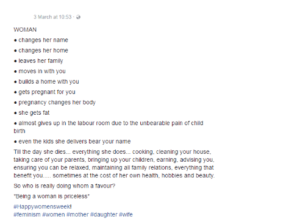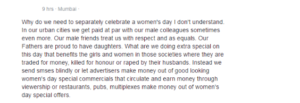This International Women’s Day, let’s radically transform our private spheres into equal spaces
This women’s day are you feeling smothered by pink messages extolling your ‘feminine’ virtues? Are you besieged by offers to buy household and beauty products at great discounts?
In the last hundred years, since the USSR, in 1917, declared 8 March as the International Working Women’s Day to commemorate the struggle of women fighting for equal labour rights, Women’s Day has come to signify a trite and consumerist celebration of ‘womanhood’ that has meant a normalisation of gender stereotypes and a subversion of its original radical and revolutionary import. Popular e-commerce sites are doling out discounts on beauty products. And, womanhood is reduced to having better skin and nothing to do with struggle for equality.
And, then there’s the glorification of ‘sacrifices’ that women make. Take this post for instance:

It is no surprise then, that women’s day ‘celebrations’ are getting to some women who are dissing the concept in its entirety.

Women’s unpaid care work and emotional labour are taken for granted, normalised and valorised. There’s no acknowledgement of the fact that globally a woman does double the amount of unpaid work than a man. This unpaid work props up our economy but has no acknowledgement in measures such as the gross domestic product (GDP). In the Global Gender Gap Index India ranks at 87 out of 144 countries with Indian women working 50 days more than men, every year. But what is the source of such disparity? How do we learn to devalue women’s work within the house and end up exempting men from all such responsibilities?
Take the story of 11-year-old Khushboo, whose day starts at 5 am and is a veritable assembly line of household chores before she goes to school. She cooks, cleans, bathes her younger brother and helps him get dressed. Her reward for this? Dry rotis (flatbreads) for breakfast, while her brothers are also served an accompanying glass of milk. Her 8-year-old brother, Shani, leads a comparatively free existence: his day is divided into school time and play time, with no responsibilities towards household chores. Khushboo comes back home to do more tasks and is left with no time to play at all. Despite these challenges, Khusbhoo dreams big and aspires to become a doctor. But are we even giving her close to a fighting chance?
Lessons in powerplay are learned at home through gender discrimination that is normalised and perpetuated within our families. And yet, in our fight towards equality, we fail to look inward, into our own homes and families -- our private spaces that are supposed to be nurturing and safe. In 95.5% of the reported 34,651 rape cases in 2015 in the country, the rapist was known to the survivor. In the media discourse too, it is the public sphere that becomes conflated with unsafety, harassment, assaults and violence. We need to reflect on how discrimination and violence is perpetuated and normalised in our private sphere. Isn’t it a violation of the most fundamental of child rights to deny a girl child a proper stab at education? Isn’t it violent to deny her of her childhood, by taking away her right to leisure, to play and instead train her to fulfill the role of a caregiver? By sending out messages such as ‘it’s okay for boys to just have fun’ to children, we are laying the foundation stone for patriarchal entitlements that enable an acid attack, an honour killing, an instance of street sexual harassment, and rape.
In a world where sexism continues to largely be the norm, how can we keep alive and take forward the legacy of the revolutionary 8 March of 1917? Certainly, not by teaching boys that women are second class citizens at home and expect a society free from inequality and violence. This International Women’s Day let’s reclaim and harness the potential and promise of the centuries long women’s struggle and radically transform our private spheres into equal spaces -- one conversation at a time.
Video by Anil Kumar Saroj | Article by Madhura Chakraborty and Nupur Sonar.
This story is part #KhelBadal, Video Volunteers’ campaign to dismantle patriarchy, one video, conversation at a time. Learn more about #KhelBadal here.
Fixing India| Catching A Human Trafficker| Featuring Navita Devi|
Because of Navita's determination and bravery, a human trafficking agent is being the bars, and the girls have returned to their homes.This is how our CC’s are helping raise issues and finding solutions.
Self-Help groups unable to reach their potential
In Udaipur village of Harhua block of Varanasi district, the Mahalaxmi Self Help Group was formed 3 years ago, but they could not operate independently, because of the high handedness of the village head and the laxity of the Government officials.

